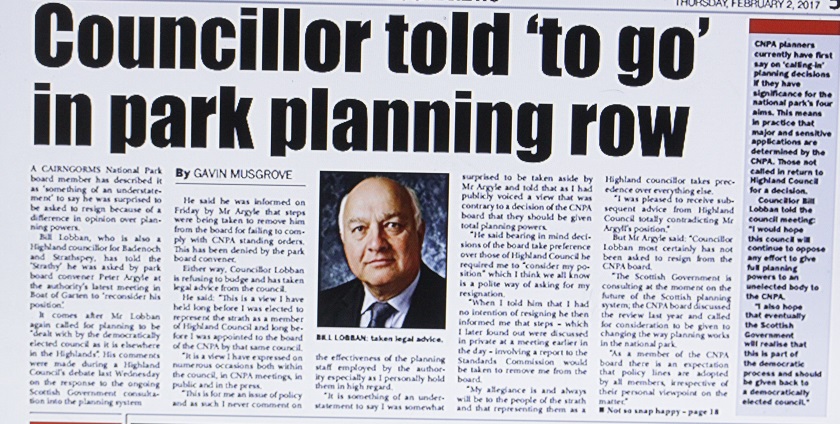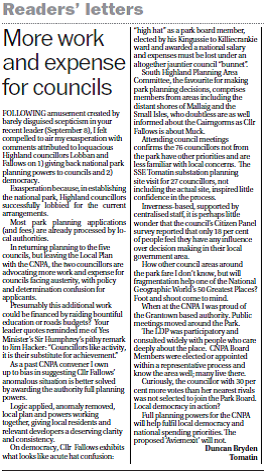 The way our National Park Boards operate is fundamental to their future. Parkswatchscotland has highlighted a large number of concerns about their governance, including a lack of transparency and decisions being taken behind closed doors in the Loch Lomond and Trossachs National Park Authority, which help explain why they are failing at present. What our National Parks need is not consensus, imposed from the top down, but open and transparent debate which engages all interests, not just businsses and landowners. For this to happen, we need Board Members who articulate different points of view and are allowed to disagree.
The way our National Park Boards operate is fundamental to their future. Parkswatchscotland has highlighted a large number of concerns about their governance, including a lack of transparency and decisions being taken behind closed doors in the Loch Lomond and Trossachs National Park Authority, which help explain why they are failing at present. What our National Parks need is not consensus, imposed from the top down, but open and transparent debate which engages all interests, not just businsses and landowners. For this to happen, we need Board Members who articulate different points of view and are allowed to disagree.
The article above from the Strathie on Thursday suggests that the very opposite is happening at present in the Cairngorms National Park Authority. While the exact words said by Park Convener Peter Argyle to Bill Lobban may well be a case of one person’s word (or memory in the heat of the moment) against another, the quote in the very last paragraph of the article does indicate there has been an attempt to silence Cllr Lobban “there is an expectation that policy lines are adopted by all members”. Its worth considering the implications of the this statement.
Just think if this line was applied to local authorities or to the Scottish Parliament, the opposition parties would be forced to adopt all the policies of the party or coalition in power. That only happens in authoritarian states. OK, so the CNPA Park Board is not like a Council, but its not like the cabinet of a ruling political party either where there is a doctrine of collective responsibility. The Convener is only involved in the appointment of some members, unlike party leaders (the Convener usually sits on the interview panel for Government nominees to the National Park Boards but its the Minister who decides). The rest are elected. So why shouldn’t members speak out?
The general issues of principle here, about free speech and open governance, are important not least so that there can be a full debate about the effectiveness of the planning system in the CNPA.
 It would appear from this letter (left) published in the Strathie in September, from previous CNPA convener, Duncan Dryden, that people high up in the Park Authority don’t like Bill Lobban’s views that the powers the CNPA has in relation to planning applications and their enforcement would be better undertaken by local authorities. Rather than trying to ridicule him, as Duncan Bryden attempted to do, or silence him, as Peter Argyle appears to want to do, what the CNPA should be doing is asking Cllr Lobban, who is vice-chair of Highland Council Planning Committee is doing better. This should be part of an informed public discussion on how the CNPA currently uses its planning powers, part of which should be an assessment of how the CNPA operates compared to other planning authorities.
It would appear from this letter (left) published in the Strathie in September, from previous CNPA convener, Duncan Dryden, that people high up in the Park Authority don’t like Bill Lobban’s views that the powers the CNPA has in relation to planning applications and their enforcement would be better undertaken by local authorities. Rather than trying to ridicule him, as Duncan Bryden attempted to do, or silence him, as Peter Argyle appears to want to do, what the CNPA should be doing is asking Cllr Lobban, who is vice-chair of Highland Council Planning Committee is doing better. This should be part of an informed public discussion on how the CNPA currently uses its planning powers, part of which should be an assessment of how the CNPA operates compared to other planning authorities.
To give one example, in terms of transparent decision making Highland Council appears considerably ahead of the CNPA. All committee meetings of Highland Council are recorded and put out as webcasts which are available on the internet for a year. So, if you want to see what contribution your local representative made at a meeting or understand how a decision was made you can see it for yourself and make a judgement. You cannot do this for CNPA meetings. George Paton has provided an eyewitness account of what happened at the Planning Committee meeting which considered the Shieling Hill Track as a comment on Parkswatch (see here). Someone has commented that he sounds like a disgruntled employee, which he is not, but how does anyone know if what he is saying is a reasonable account of the meeting? Its George Paton’s word against the National Park, rather like it being Cllr Lobban’s word against Peter Argyle’s. Not a satisfactory situation.
One might think this would be easy enough to address, all the CNPA needs to do is to make the recordings it used to make of planning meetings for minuting purposes public. However, Parkswatch has just been informed that after the Badenoch and Strathspey Conservation Group asked for the recording of the last planning meeting under FOI they have been told: “A recording is not available as we no longer record planning meetings”. This change follows CNPA’s attempt to stop photographers from the Strathie taking photos at Board meetings. It looks like they are copying the Loch Lomond and Trossachs National Park Authority who forbid all recording. If Highland Council and our Scottish Parliament can broadcast their meetings, so can our National Parks. What have the CNPA got to hide?
Democracy requires openness and transparency and the problem with our National Parks at present is they are unaccountable, except upwards to the Minister. We need National Parks which are accountable to the people who live there and visit. This means we need absolutely to defend Cllr Lobban’s right, and the right of other Board Members, to express their views in public.
By chance, a by-election for a locally elected member has just been announced in the CNPA (see below). I hope all candidates commit to making the Park more open and transparent in the way it operates and declare they are happy to have their contributions at meetings recorded and available to all to watch.
CNPA Board By-Election
Nominations open today (2 February) for the CNPA by-election with a deadline for submission of 23 February. Triggered by the resignation of Katrina Farquhar, a vacancy is available on the CNPA Park Board to represent Ward 5, which covers Deeside, Glenshee and the Angus areas of the Cairngorms National Park.
It is the Park Authority’s role to safeguard the outstanding landscapes, rich habitats, rare wildlife – and of course, the Park’s communities – while helping to develop a sustainable economy within the National Park. The board of the Park Authority agree the long term objectives for the Park and set out the CNPA’s priorities for work. They also play a key role in representing the National Park and the Park Authority by acting as ambassadors.
A Depute Returning Officer from Aberdeenshire Council is to administer the by-election so for information on how to stand and on the nomination process visit the Council’s website. All registered voters in Ward 5 over the age of 16 will receive their postal votes around the 8 March with votes to be returned by 4pm on Thursday 30 March. Information on current board members can be found here .The appointment will be from 1 May 2017 to the next park-wide elections in 2019.
“there is an expectation that policy lines are adopted by all members”
Who made this rule up, the precise reason councilors are placed on the National Parks Board is to to provide balance in challenging the ill conceived plans and decisions that the National Park Authorities seem intent on making.
This blind adoption of policy by all members is nothing short of dictatorship and we have seen the result of this at Loch Lomond National Park where the democratic process together with all reason have been ignored in favour of policy agreed behind closed doors at high level.
It’s the job of councilors and other board members to challenge these excesses and look after the interests of the environment and park users. The Boards of both our National Parks are failing us in this respect and it’s time Roseanna Cunningham did her job for the environment by intervening, although I suspect she is probably instrumental in driving this overzealous commercialisation of National Parks forward.